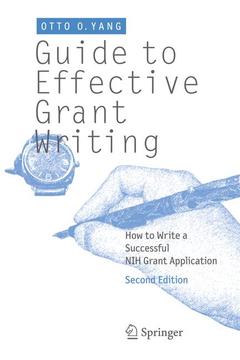Description
Guide to Effective Grant Writing (2nd Ed., 2nd ed. 2012)
How to Write a Successful NIH Grant Application
Author: Yang Otto O
Language: English
Subjects for Guide to Effective Grant Writing:
Keywords
90 p. · Paperback
Description
/li>Contents
/li>Biography
/li>Comment
/li>
Preface To The First Edition.- Preface To The Current Edition.-Overview: Overall Goals When Writing Grant Applications.- Organization And Use This Guide.- Preparing To Write.- Types Of Nih Grants.- Anatomy Of The Nih Grant Application.- Starting To Write: Deciding The Research Aims And Overcoming Writer’s Block.- Organization And Writing Style.- Figures And Tables.- Specific Aims.- Research Strategy: Significance.- Research Strategy: Innovation.- Research Strategy: Approach.- Bibliography And References Cited.- Appendices.- Collaborators And Consultants.- Training And Career Development Grants.- Administrative Sections And Submission Process.- Scoring Process.- Resubmitting An Application.- Non-Nih Grants.- Conclusions.- Appendix: Useful Web Resources.- Index.
Dr. Yang attended college and medical school at Brown University and completed a residency internal medicine at Bellevue Hospital/New York University. During his Infectious Diseases fellowship training at Massachusetts General Hospital/Harvard Medical School, he began his research career studying the role of cellular immunity against HIV-1. During his fellowship training, he received NIH F32 and K08 grants, followed by an R01 grant as an instructor. He is currently a professor at University of California Los Angeles, where he has been on the faculty since 1999.
The 2nd edition to the popular original
Definitive guide to the NIH review process
Straightforward approach points out common errors in grant writing

